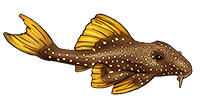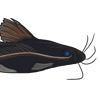bristlenose / ancistrus cheek spines ripped almost out
-
AquaCavesUK
- Posts: 16
- Joined: 24 Apr 2019, 14:37
- My cats species list: 1 (i:1, k:0)
- My BLogs: 1 (i:4, p:52)
- Spotted: 1
- Location 1: Norwich Norfolk
- Location 2: United Kingdom GB
- Contact:
bristlenose / ancistrus cheek spines ripped almost out
Have a Adult female Red Bristlenose, found her under / behind my intake (course) pre filter - guess male chased her...
thought dead as she floated lifeless, when released, but still had colour and had seen her 10-15 mins before, a few sweeps by hand, up and down tank, shes slowly came back to life. 24 hrs later now in hospital tank, she eating and swimming fine, coloured up and fins normal (not clamped or fully extended)
The only problem is her left cheek spines are ripped out of head and angle 45 forward - can see (cheek end ) of defleshed white boney part of spine like a ball ( like on a human bone ball/socket) the flesh is mostly intact, its just like the ball has popped out of cheek socket.
Do these heal? or fall off, to be honest I cant see it being possible to hold her and relocate spine to correct angle, I would not anyway as would be further stress.
So i'm guessing just a case of wait and see, hopefully it wont get infected and she will survive... as shes the better coloured and younger but now fully mature of my 2 red females and a proven breeder...
thought dead as she floated lifeless, when released, but still had colour and had seen her 10-15 mins before, a few sweeps by hand, up and down tank, shes slowly came back to life. 24 hrs later now in hospital tank, she eating and swimming fine, coloured up and fins normal (not clamped or fully extended)
The only problem is her left cheek spines are ripped out of head and angle 45 forward - can see (cheek end ) of defleshed white boney part of spine like a ball ( like on a human bone ball/socket) the flesh is mostly intact, its just like the ball has popped out of cheek socket.
Do these heal? or fall off, to be honest I cant see it being possible to hold her and relocate spine to correct angle, I would not anyway as would be further stress.
So i'm guessing just a case of wait and see, hopefully it wont get infected and she will survive... as shes the better coloured and younger but now fully mature of my 2 red females and a proven breeder...
- Lycosid
- Posts: 191
- Joined: 20 Aug 2016, 21:18
- My cats species list: 7 (i:0, k:0)
- Spotted: 4
- Location 1: United States
- Location 2: North Carolina
Re: bristlenose / ancistrus cheek spines ripped almost out
I'm trying to envision this. The spines are attached to the operculum (gill flap). Behind the operculum are the delicate, red gill filaments. Is it the entire operculum that is bent back? I'd worry most about exposed gill filaments, so if it's just the spines (not the whole operculum) I wouldn't worry as much. (Obviously, open wounds can be infection sites, but the physical damage would be mostly cosmetic.)AquaCavesUK wrote: ↑11 Sep 2019, 20:46 The only problem is her left cheek spines are ripped out of head and angle 45 forward - can see (cheek end ) of defleshed white boney part of spine like a ball ( like on a human bone ball/socket) the flesh is mostly intact, its just like the ball has popped out of cheek socket.
-
AquaCavesUK
- Posts: 16
- Joined: 24 Apr 2019, 14:37
- My cats species list: 1 (i:1, k:0)
- My BLogs: 1 (i:4, p:52)
- Spotted: 1
- Location 1: Norwich Norfolk
- Location 2: United Kingdom GB
- Contact:
Re: bristlenose / ancistrus cheek spines ripped almost out
the pointy bit of spines still has flesh, trace back down spine to base / cheek and its loose / detached -
- bekateen
- Posts: 9355
- Joined: 09 Sep 2014, 17:50
- I've donated: $40.00!
- My articles: 4
- My images: 143
- My cats species list: 145 (i:105, k:35)
- My aquaria list: 37 (i:14)
- My BLogs: 45 (i:153, p:2735)
- My Wishlist: 36
- Spotted: 183
- Location 1: USA, California, Stockton
- Location 2: USA, California, Stockton
- Contact:
Re: bristlenose / ancistrus cheek spines ripped almost out
I've never seen an injury like this before. Sure many odontodes regrow (my male P. compta drop their caudal odontodes seasonally), but I don't know if it happens with these.
Take care of her and see what happens. As Lycosid said, the gill filaments are the biggest concern.
Please keep us updated.
Good luck!
Eric
Take care of her and see what happens. As Lycosid said, the gill filaments are the biggest concern.
Please keep us updated.
Good luck!
Eric
Find me on YouTube & Facebook: http://youtube.com/user/Bekateen1; https://www.facebook.com/Bekateen
Buying caves from https://plecocaves.com? Plecocaves sponsor Bekateen's Fishroom. Use coupon code bekateen for 15% off your order. Also, for you Swifties: Https://youtu.be/ZUKdhXL3NCw




